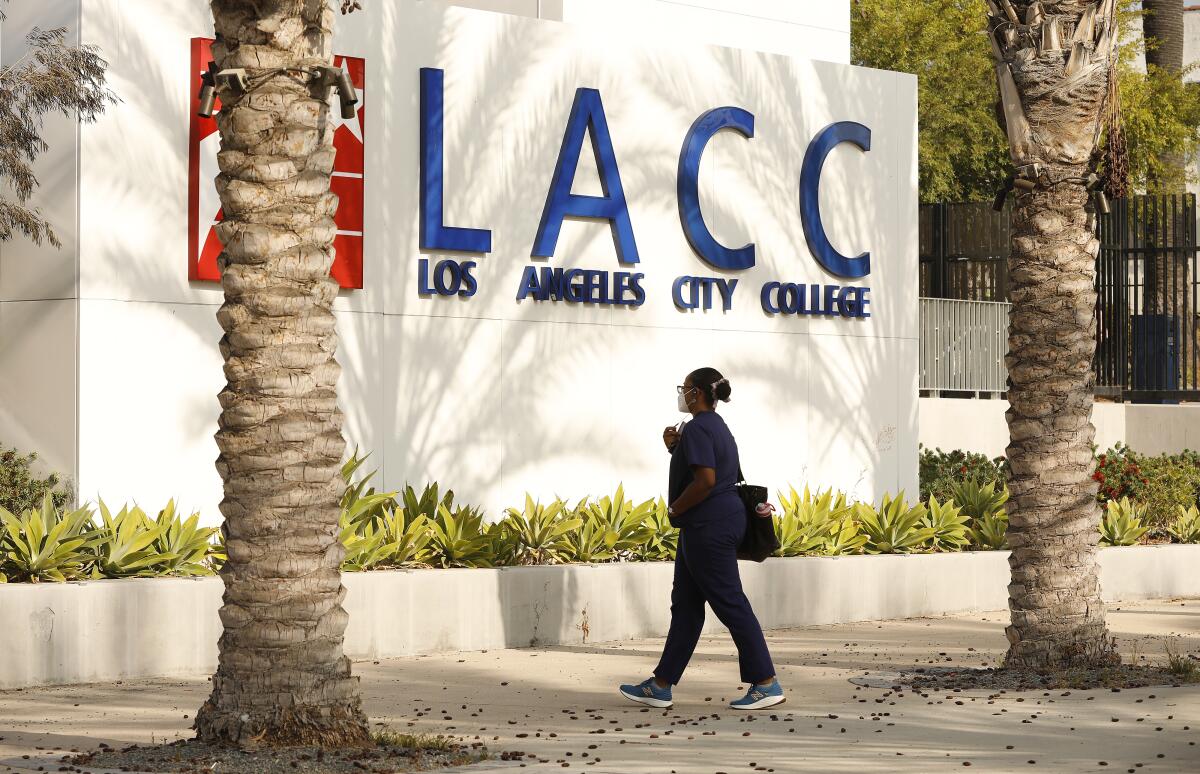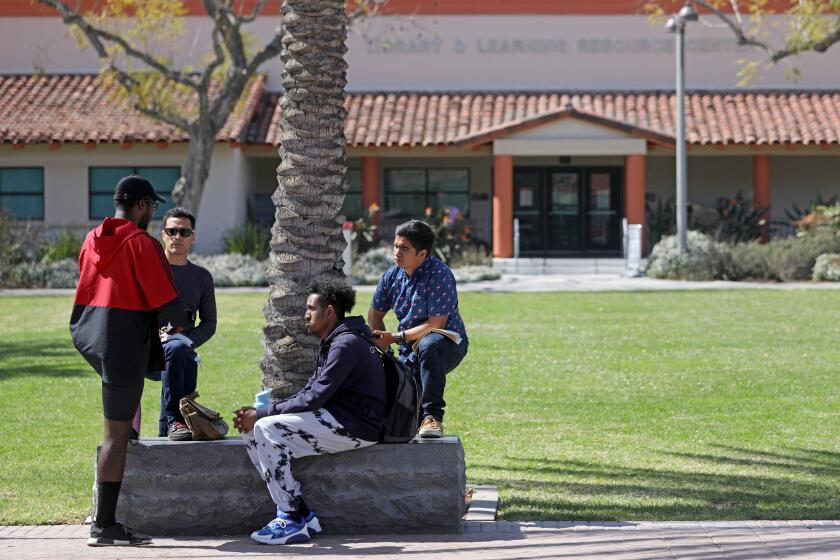Dozens of community colleges failed to turn over fraud data on possible fake enrollment

- Share via
Despite a request last August from the chancellor’s office that all 116 California Community Colleges report on enrollment fraud involving fake student bots, nearly 40% of campuses failed to submit any information, deepening concerns among the Board of Governors on Monday about the extent of possible wrongdoing and how it may be affecting the system’s plunging enrollment.
The lack of responses from 44 campuses — including all nine within the Los Angeles Community College District, the largest district in the nation — makes it difficult for officials to assess whether the community college system has a firm grasp on its enrollment crisis and how widespread fake enrollments may be at a time when administrators are scrambling to figure out how to stem an estimated enrollment drop of 20% from fall 2019 to fall 2021.
In addition, 15% of the system’s colleges have not answered preliminary enrollment surveys, which help guide strategies to increase enrollment after the pandemic decline.
“The lack of responses to the enrollment surveys hinders the ability to gauge trends within a semester,” spokesperson Paul Feist said. “The colleges all eventually report actual enrollment, but don’t finish doing so until after the semester ends. Our current data infrastructure does not permit real-time views of enrollment. Surveys provide some type of proxy, or preview.”
New research suggests colleges’ policies around unpaid balances may be contributing to an enrollment decline while doing lasting financial harm to students.
During a Board of Governors meeting Monday, there were no clear answers on why campuses ignored the requests. After a public comment period, board members will decide whether to mandate the reports. The state funds community colleges based on enrollment. During the pandemic and through the 2024-25 school year, campuses will not be financially penalized for drops. But future drops in students could affect funding.
Board Vice President Amy Costa said she was “dumbfounded” by the lack of response. Board Member Bill Rawlings said that at his campus, Mt. San Antonio College, the chief technology officer complained about having to provide data when others do not consistently do so, raising the question of whether some campuses have interpreted the data requests as optional.
“I think that people have been struggling with what to make public and what not to make public,” said Valerie Lundy-Wagner, vice chancellor for digital innovation and infrastructure. “I think around enrollment, you know, it’s a crazy time right now. It’s hard to look and see these things. I think oftentimes, people are afraid of numbers because of what they can say. And so, you know, when you don’t respond, it means you kind of don’t have to look at it.”
During the meeting, Chancellor Eloy Oakley did not comment on the situation.
The Los Angeles college district did not respond to a request for comment about why campuses have not filed reports.
At least eight colleges sent reports for the first time after the board item was made public, Feist said.
The dearth of data comes after The Times first reported in August that thousands of fake student bots had enrolled in community college classes throughout the state and that more than 65,000 had applied for financial aid at a time when the college system had received significant COVID-19 relief for students. In the months since, the decentralized college system has not been able to provide a complete picture on the number of bot attempts.
In August, after finding that 20% of recent traffic on the main portal for online applications was malicious and bot-related, the community college system requested that all districts and their campuses report monthly the number of incidents of suspected and confirmed registration fraud, confirmed number of incidents of financial aid fraud, and its dollar value. Those measures expanded upon security practices implemented previously, including bot detection software.
The community college system has continued to combat the issue. In January, it added a “multi-factor verification of student email and/or phone number” to help fend off fraud, according to a January memo.
Previous public records requests from The Times seeking information related to the data asked of the colleges were denied and “exempt from disclosure,” college officials said, because they are linked to investigatory records or personnel files or because of state and federal laws. The chancellor’s office has not released any update on the investigation, the extent of the problem or possible monetary losses.
A professor at Pierce College has spent months searching for fake students who are enrolled in classes.
Kim Rich, a professor at Pierce College within the Los Angeles Community College District, told The Times last year that she had found thousands of bot students on her own, but remained in the dark over what was done to eradicate them from the system. On Monday, she said that she has continued to identify hundreds of suspected bot students enrolled throughout the district.
“The fact that this has not been remedied over the last several months is absolute incompetency,” said Rich, who filed a grievance against Pierce administration earlier this month over the “failure to authenticate students.”
To fix the data collection issues, the board proposed requiring districts to respond to information and data requests from the chancellor’s office within 10 days — the standard time frame under the Public Records Act. Colleges would not have to provide the information requested within that time frame but would be obligated to acknowledge the request.
Colleges are required to report fraud to the Department of Education, Office of the Inspector General, a January memo from Lundy-Wagner noted. In the third memo since last year about fraudulent activity, she reiterated to colleges that they were supposed to share information related to fraud on the 10th of each month and said that the chancellor’s office had “observed modest participation from colleges and districts in the monthly reporting of fraudulent activity.”
Gov. Gavin Newsom’s budget proposal includes millions of dollars for the community colleges’ modernization of technology, the memo notes, which would include the protection of sensitive data.
More to Read
Sign up for Essential California
The most important California stories and recommendations in your inbox every morning.
You may occasionally receive promotional content from the Los Angeles Times.













